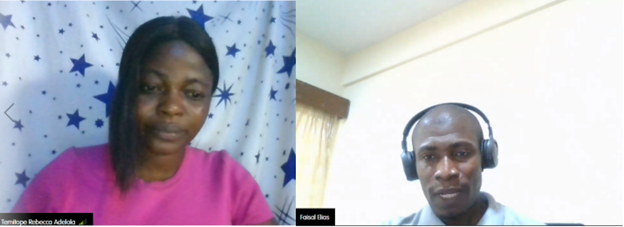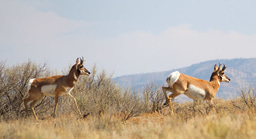Shaping Conservation Results in Communities: Communication and Policy Perspectives

Faisal, currently serving as the Development and Policy Manager at the Ghana Wildlife Society, shared his experiences and insights towards shaping the results of conservation in communities.

"When individuals feel a sense of belonging, all voices have the opportunity to be heard for a much more effective policy." (Faisal Elias, Development and Policy Manager, Ghana Wildlife Society)
Temi: As the Development and Policy Manager at Ghana Wildlife Society, how do you approach the task of fostering conservation education?
Faisal: "I recognize the significance of establishing a strong working relationship with communities living in biodiversity-rich areas." By actively engaging with the people, building their capacity, and demonstrating a genuine interest in their livelihoods, Faisal fosters a win-win situation for both conservation and development. "In addition, I recognized the power of teamwork, collaboration, and partnerships with other NGOs, which is important to preventing duplication of efforts and allowing for a complementary approach to conservation initiatives."
Temi: Policy advocacy is a critical driver of conservation efforts. Can you provide insights into effective strategies for influencing policy change and promoting legislation that supports conservation?
Faisal: “Successful policy advocacy requires patience, perseverance, and a comprehensive understanding of the political landscape”
There is a need for effective communication and collaboration with policymakers. Most especially, engagement in dialogue, consultations, and advocacy efforts to effectively convey the significance of conservation and the need for supportive policies. By building relationships and establishing trust, I seek to create a conducive environment for policymakers to embrace conservation as a shared priority. One key strategy I employ is to present evidence-based recommendations to policymakers. I understand that policymaking can be a complex and time-consuming process, and thus strives to simplify complex conservation messages and present them in a clear and understandable manner. By providing well-researched facts, data, and case studies, I aim to demonstrate the importance and potential benefits of a conservation-friendly policy.
Temi: Effective communication plays a vital role in engaging diverse stakeholders in conservation initiatives. How do you overcome the challenge of effectively communicating complex conservation messages to different target audiences?
Faisal: "Adopting innovative approaches can significantly improve conservation communication across diverse audiences."
I further believe in actively engaging with diverse stakeholders and creating an inclusive environment that values and respects all perspectives. I recognize the power of utilizing multiple communication channels, including social media, to reach a broader audience, incorporating art and culture into conservation education, and ensuring that it is delivered in a culturally sensitive manner that aligns with the values of the communities involved. By focusing on improving livelihoods, using evidence-based approaches, and facilitating meaningful connections to nature, such as through activities like bird watching, I aim to build awareness and understanding among different target audiences.
As an example, the effectiveness of agroforestry as a conservation practice resonates with communities is what I resonate with. By providing incentives to farmers in the form of seedlings and commercial crops, a win-win situation is created. Farmers are encouraged to plant trees on their farmland to mitigate the effects of climate change, improve soil health, and create a favorable microclimate. However, it is important to point out the need to address issues of benefit sharing. Currently, in Ghana, the government benefits financially from trees planted on farmland, while the farmers themselves do not receive adequate benefits, leading to discouragement. Therefore, I encourage the importance of considering the well-being of the environment, the local communities, and the government to ensure an effective communication and sustainable approach.
Temi: What are some of the most significant challenges that conservation organizations face, and how do you think that they can be addressed?
Based on his experience, Faisal has identified several noteworthy challenges encountered by conservation organizations. These challenges include:
- Diminishing international funding: Conservation organizations often struggle with a decrease in international funding, which creates a more competitive landscape among local NGOs. This scarcity of resources can hinder their ability to carry out conservation initiatives effectively.
- Lack of collaboration and competition: Instead of working together towards common conservation goals, there is a tendency for organizations to pursue their objectives independently. This lack of collaboration can lead to conflicts and hamper collective progress.
- Perceived adversarial relationship with government: Many governments perceive NGOs as adversaries rather than partners in sustainable development. This adversarial mindset can hinder cooperation and limit the potential for fruitful partnerships.
- Limited expertise and capacity: Some NGOs face challenges in attracting and retaining skilled professionals due to financial constraints. This can result in a lack of expertise within the organization and impede their ability to implement effective conservation strategies.
Temi: “As a conservation leader, what advice would you offer to aspiring conservationists who are passionate about making a positive impact?”
Faisal’s recommendations are to:
- Embrace Multidisciplinary Knowledge: To achieve robust conservation outcomes, it is crucial to have a comprehensive understanding of the multidisciplinary aspects of conservation.
- Highlight the Value of Conservation: By emphasizing the importance of capacity building, you can showcase how investing in conservation leads to personal growth, professional fulfillment, and positive long-term outcomes for both nature and communities.
- Connect with Nature: Spend time in natural environments, immerse yourself in the beauty and intricacies of the natural world, and cultivate a genuine appreciation for its wonders.
- Collaborate and Seek Mentorship: Conservation is a collective endeavor. Seek opportunities to collaborate with fellow conservationists, researchers, organizations, and local communities. Additionally, seek mentorship from experienced conservation leaders who can provide guidance, support, and valuable insights based on their own experiences in the field.
- Be Resilient and Adaptive: Cultivate resilience and adaptability to overcome obstacles and navigate changing circumstances. Learn from failures, embrace continuous learning, and be open to new ideas and approaches.
Faisal's lessons learned in summary are:
- Building Community Relationships: By engaging with communities, building their capacity, and showing genuine interest in their livelihoods, we can foster mutual understanding and support.
- Emphasizing Collaboration among NGOs: Working together duplication of efforts and allows for a complementary approach to conservation initiatives. By joining forces, we can achieve greater impact and address conservation challenges more effectively.
- Conservation efforts should embrace a multidisciplinary approach, including social sciences. Understanding the social dynamics and rural changes associated with conservation is vital. Building a strong working relationship between conservation practitioners and social scientists ensures a comprehensive approach to address all aspects of conservation.
- Empowering Youth: Providing opportunities and platforms for the youth is crucial for the future of conservation. By nurturing their ideas, skills, and passion, we can harness their energy and innovation to propel conservation efforts forward.
Last message
“Conservation is a fascinating field, and one does not have to be a conservationist through a degree program. It is crucial for everyone to take responsibility for protecting their environment, preserving species, and ensuring that animals have the freedom to thrive in undisturbed habitats.” (Faisal Elias, Development and Policy Manager, Ghana Wildlife Society)




Please sign in or register for FREE
If you are a registered user on WildHub, please sign in
Useful insights - thank you for sharing @Faisal Elias and for catalysing the sharing of these expert insights @Temitope Rebecca Adelola - wonderful to see the outcome of your fruitful conversation!
@Faisal Elias : what do you enjoy most in your current role as Development and Policy Manager at the Ghana Wildlife Society?
Inasmuch as my role is tasking, I enjoy meeting people, at all levels, and learning from them and listerning to their stories. Also, when we are able to win funding and observe satisfaction from donors.
Your words resonate with me Faisal, I also enjoy the connections with our diverse community of conservation professionals who have so much knowledge and expertise that they can exchange with each other. Thank you for sharing your insights with us.
Thank you @Temitope Rebecca Adelola for bringing light to my story.
Incredible article. @Temitope Rebecca Adelola I'm so I'm so impressed with the way you communicate. @Faisal Elias thank you for sharing your insights and wisdom, you are very good at what you do.
@Temitope Rebecca Adelola I really enjoyed your interview with @Faisal Elias, you covered a lot of ground in your discussion!
I wondered if there was a network of NGOs in Ghana that work together in some of the advocacy work you do @Faisal Elias ? I'm based in Scotland and your comments made me think about how former colleagues of mine worked with Scottish Environment Link to amplify the voice of the Conservation community.
Yes, we do have networks of NGOs working together to advocate. But they are more of a ad hoc kind of coalition that are formed in response to certain issues in the sector. We do work together but we all have our approaches, aims and visions, so sometimes these things limit the extent of the network because it has to be line with everyone, the need for agreements.
Thanks for your response @Faisal Elias , yes that sounds like a similar situation arises in all such coalitions, when there are some issues that different NGOs will have very different perspectives. We see that in Scotland where certain joint campaigns only involve some organisations.